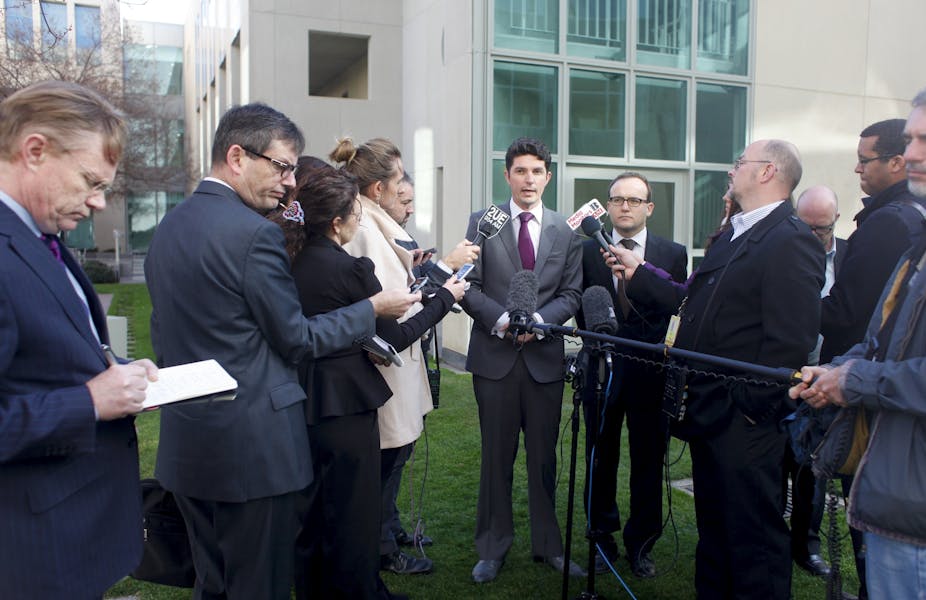“A newspaper is a private enterprise owing nothing whatsoever to the public, which grants it no franchise. It is therefore affected with no public interest.” - William Peter Hamilton, a former publisher of the Wall Street Journal.
That quote is particularly poignant this week as News Limited follows Fairfax in shedding staff and restructuring its business activities. News Ltd’s Chief executive Kim Williams today told staff there would be job losses through retrenchments and natural attrition as the group moves to centralise its operations from 19 to five divisions under a “one city, one newsroom” strategy. He did not say how many jobs would need to be shed.
Are we really becoming like the Americans, where newspapers owe nothing to the public? Perhaps. But my entire reason for educating young people about the practical skills of the Fourth Estate is to ensure that there are Australians capable to shining a light on politicians – and industry – who are working against the public interests. That’s our collective interest as Australians. And it’s those interests which are currently under attack.
Bernard Cohen wrote in 1993 wrote: “the press may not be successful much of the time in telling people what to think … it is stunningly successful in telling its readers what to think about”.
But the moves of News Limited and Fairfax this week will ultimately mean fewer and fewer voices, and fewer things to think about. This week’s announcements won’t stop the decline of newspapers - it will accelerate it. With fewer journalists, more generic content, more sub-editing outsourced to Page Masters in New Zealand, our Australian newspapers will become a pale imitation of what they are now, which is a pale imitation of what they once were.
Put it this way - with fewer journalists at our major newspapers, those who are left will become even more captive to vested interests than they were before – and that’s regardless of Gina arriving or Rupert leaving. Media moguls have come and gone – and most have been bad – that’s not the big issue. The bigger issue is diversity of voices heard by Australians.
Just look at Australian Provincial Newspapers (APN) where its once vibrant local and regional titles have been swallowed up and become cookie cutter facsimiles of each other. The life has gone out of them. They don’t have the same connection to the communities that they once had. It’s the same with Fairfax’s community papers: while still strong in some ways, they are really now only vehicles for display ads for houses. And let us not forget just how out-gunned Australian journalists are against the onslaught of the public relations industry.
But despite the doom and gloom, I’ve sent messages to my very talented pool of soon-to-be journalism graduates to “chillax”. These announcements are part of trend that has been happening in the mass media for some time – perhaps as much as 30 years. Clever young people who want to work in the modern media environment understand they need to do better than their predecessors, in particular the antics exposed by the Leveson Inquiry in the UK and our own Cash for Comment scandal in Australia. Young people know that the papers which are surviving and thriving – are either incredibly in touch with their local communities or ones which are doing great journalism.
Frankly, the legacy media have given few opportunities to journalism graduates in the past few years – smart young people have been snapped up by new media. For the sake of democracy and our country we need to support these new digital providers.
Let’s hope that Communications Minister Stephen Conroy and his colleagues remember one important thing as they read of Business Spectator – run by heavy-hitting journos Alan Kohler, Stephen Bartholomeusz and Robert Gottliebsen – being swallowed up by News Limited:
“The media are the principal carriers of the life blood of democracy: information. It is their responsibility, therefore, to maximise the opportunities for citizens to make political decisions and cast ballots on the basis of informed choice – retrospectively, about the extent to which the government has kept its promises in office, and prospectively, about how rival candidates will act if (re)elected to office.” (Gunther and Mughan, 2000.)
Or in more home-spun terms, the words of the late Queensland premier Sir Joh Bjelke-Petersen: “The greatest thing that could happen in the state and the nation is when we get rid of the media. Then we would live in peace and tranquillity and no one would know anything.”

